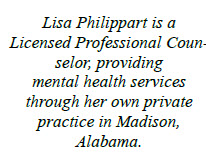 By: Lisa Philippart
By: Lisa Philippart
We can all think back on times when anger led us to poor decisions, regrettable behavior, or hurt feelings. But no matter what role anger plays in your life—from occasional irritability to incarceration—the key to dealing with anger more effectively is to understand how it works. Let’s take a look at some of the common myths and misunderstandings we might have about anger.
 Let’s begin by making an essential distinction right off the bat: Anger is different than aggression. Psychologically speaking, anger is an emotion while aggression is a behavior. Even though these two words seem almost synonymous, they differ completely on one key dimension….control. As I have mentioned in previous articles, technically speaking, you can’t exert direct control over any emotion, including anger. And because you can’t control your emotions directly, you can’t be responsible for them. In fact, this distinction is part of our legal system. Nobody gets sent to prison for how they felt, no matter how angry or emotional they were. Instead, the punishment is based on what we do, including acting aggressively toward other people. You can only influence your emotions indirectly by way of how you think and how you behave. For example, you can choose to ruminate on all the terrible drivers in this town (increase anger) or you can contemplate how grateful you are that you’ve never been in a serious car accident (decrease anger.)
Let’s begin by making an essential distinction right off the bat: Anger is different than aggression. Psychologically speaking, anger is an emotion while aggression is a behavior. Even though these two words seem almost synonymous, they differ completely on one key dimension….control. As I have mentioned in previous articles, technically speaking, you can’t exert direct control over any emotion, including anger. And because you can’t control your emotions directly, you can’t be responsible for them. In fact, this distinction is part of our legal system. Nobody gets sent to prison for how they felt, no matter how angry or emotional they were. Instead, the punishment is based on what we do, including acting aggressively toward other people. You can only influence your emotions indirectly by way of how you think and how you behave. For example, you can choose to ruminate on all the terrible drivers in this town (increase anger) or you can contemplate how grateful you are that you’ve never been in a serious car accident (decrease anger.)
 You can’t control anger directly, but you can control your aggression. Specifically, most people assume they should manage their anger (after all, everyone talks about anger management, right?). But when we try and inevitably fail to do so, two unfortunate things happen: First, we feel angry and disappointed in ourselves. Second, we waste valuable psychological resources that could have been much better spent managing our aggression. Put another way, the cost of trying to control your anger is losing control over your aggression. If trying to control your anger only makes it stronger, and makes it more likely that you’ll act aggressively, the solution is to invert or flip the relationship. Acknowledge and accept your anger for what it is and direct your efforts at control toward your aggression instead. And remember, aggression does not just mean big acts of violence. Being overly critical or judgmental of someone in your mind is an act of aggression, as is replying sarcastically or rolling your eyes at someone.
You can’t control anger directly, but you can control your aggression. Specifically, most people assume they should manage their anger (after all, everyone talks about anger management, right?). But when we try and inevitably fail to do so, two unfortunate things happen: First, we feel angry and disappointed in ourselves. Second, we waste valuable psychological resources that could have been much better spent managing our aggression. Put another way, the cost of trying to control your anger is losing control over your aggression. If trying to control your anger only makes it stronger, and makes it more likely that you’ll act aggressively, the solution is to invert or flip the relationship. Acknowledge and accept your anger for what it is and direct your efforts at control toward your aggression instead. And remember, aggression does not just mean big acts of violence. Being overly critical or judgmental of someone in your mind is an act of aggression, as is replying sarcastically or rolling your eyes at someone.

Another misconception about anger is that you have to express your anger in order to release it. The idea that we need to express, release, or vent our anger or else it will become destructive has been around since the days of Freud, which is certainly long enough to seep its way into popular culture and imagination. The only problem is, it’s not true. Research consistently shows that the cathartic theory of anger (venting or ruminating on your anger in order to release it) does nothing to lessen its intensity. And in fact, it actually makes it stronger! On the other hand, doing nothing or simply distracting yourself tends to lead to less intense anger and a lower likelihood of acting aggressively. There is an important distinction between the emotion of anger and the issue behind the anger. For example, if you are frustrated with a co-worker who is late with her monthly report again, venting about it to a friend isn’t helpful. However, having a respectful and honest conversation with your co-worker about the issue likely will be. In other words, try to address the source of the anger, not the anger itself.
In my next article we will continue with understanding the myths of anger, beginning with anger as a negative emotion.
By: Lisa Philippart
Licensed Professional Counselor






